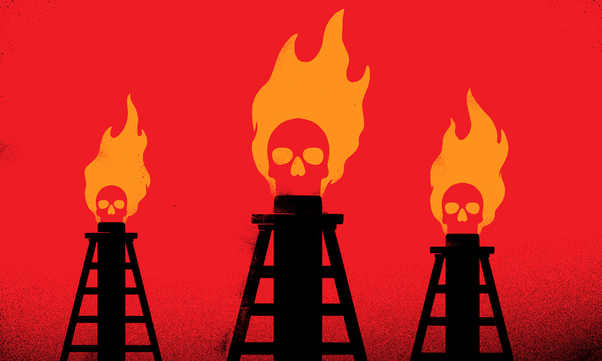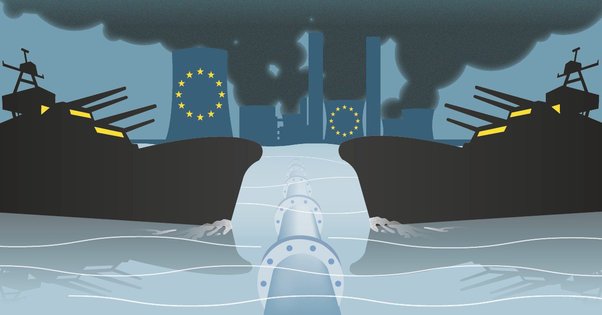$223 billion of this to be spent on new gas production to supply Europe
The fossil fuel industry is forecast to spend more than one trillion dollars globally over the next decade on producing gas for European markets, according to Global Witness analysis of Rystad Energy data.
Despite climate and energy experts’ warnings that any new fossil fuel production will push the world beyond 1.5°C heating, $223 billion of this trillion dollar sum is set to go on developing and operating new gas extraction sites to supply Europe.
The oil giants Shell, TotalEnergies, ExxonMobil, Equinor and Eni are among the forecast top spenders. Together, these five companies are on course to sink a total of $144 billion into gas supply for the continent over this period.
Annual expenditure by the top 20 companies producing for Europe is set to increase by three-quarters, from $60 billion in 2024, to $105 billion in 2033.
The analysis includes both fossil gas and gas condensate, a by-product of gas extraction used to manufacture kerosene, diesel and other fossil fuels. Burning the fossil gas alone from forecast production for Europe – 3,486 billion cubic metres – would emit 6.6 billion tonnes of carbon dioxide between now and 2033 – equivalent to 23 years’ worth of France’s carbon emissions.
The 6.6 billion emissions figure is for carbon dioxide only, and would be significantly higher if it included methane emissions.
The International Energy Agency (IEA) estimates that the EU will account for 66% of the overall gas volumes consumed in the wider European region in 2024, with its share staying virtually the same in 2030 at 65%.
In February, the European Commission is due to unveil its proposals for a target to cut the EU’s emissions by 2040.
Dominic Eagleton, senior fossil fuels campaigner at Global Witness, said “The numbers are stark – Europe is hurtling down a dangerous path by doubling down on fossil gas, and needs to pull out all the stops to end the age of fossil fuels. The European Commission must seize its chance to quicken Europe’s exit from gas and set 2035 as a target date to phase out this costly, crisis-ridden and climate-boiling fossil fuel.”
Industry lobbyists claim that fossil gas is cleaner than oil or coal, and therefore should be promoted as a ‘bridge fuel’ during the transition to renewables – even though gas is often worse for the climate than oil or coal when its methane emissions are accounted for.
According to the Intergovernmental Panel on Climate Change, greenhouse gas emissions from existing fossil fuel infrastructure – let alone adding more emissions from new projects – are more than enough to push the world beyond 1.5°C heating.
The IEA, meanwhile, includes no new fossil fuel investments in its energy scenario modelling for capping the global temperature rise at 1.5°C.
Demand for fossil gas will fall dramatically if governments step up the actions needed to avoid catastrophic global heating. Energy scenario modelling by Climate Action Network Europe shows that accelerating the rollout of renewables and energy efficiency would bring gas demand down to negligible levels in the EU by 2035, in line with climate science. [3] Declining demand for gas could make new fields obsolete, leaving fossil fuel companies unable to recoup their investment costs.
Notes to editor:
Methodology
Data on forecast gas production and expenditure (opex and capex) were sourced from the business intelligence agency Rystad Energy’s UCube database. UCube is an integrated field-by-field database of the global upstream oil and gas market, covering the time span from 1900 to 2100. Rystad data is widely referenced by major oil and gas companies, the media and international bodies such as the IEA.
UCube takes into account oil and gas demand to forecast asset-level supply and expenditure. Forecasts are based on sources including company disclosures (e.g. earnings and profits reporting) and policies, government sources, energy service reporting, energy agencies, academic research and news articles. Where data is unavailable, data is modelled based on the above sources and supported by a comprehensive database of global oil and gas fields.
UCube assumes a mean warming scenario of 1.9°C hotter than pre-industrial temperatures, where global oil demand peaks at 107 million bpd by 2026 and declines progressively to 66 million bpd by 2050. It also assumes a CCUS capacity of 600 million tonnes per year globally by 2030.
UCube assumes a base case scenario for fossil gas demand by geographic region, including Europe (all European countries except Russia). Drawing on historical gas flows, asset-level analysis and modelling, it shows which gas production sites are expected meet this demand.
We filtered UCube data on forecast gas production to meet Europe’s demand from 2024-2030. The data includes all assets that are currently producing, those under development (assets for which development has been approved but production has not yet started), discovery (assets where discoveries have been made, but are not yet in a phase of further development) and undiscovered (assets with estimated quantities of oil and gas that are probably present but have not yet been proven by drilling).
Emissions calculations are based on the widely used metric of 1.9 kg CO2 emissions per cubic metre of fossil gas consumed. The emissions figures do not factor in greenhouse gas emissions from gas condensate or from fossil gas production, processing and transport, making them conservative estimates.
The US dollar values for expenditure are nominal and assume 2.5% inflation.
Detailed methodology and data are available on request.


